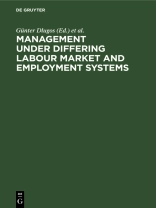Cuprins
Frontmatter – Preface – Contents – Contributors – Introduction – A. The Future of the Working Society – The Future of the Working Society – Labour as Factor of Production or Yardstick for Distribution – B. Theoretical Approaches to the Analysis of Management Employee Relations – The Employment Relation from the Transactions Cost Perspective – Asset Specificity, Governance, and the Employment Relation – An Evolutionary View on Changes in Employment Relationships: The Evolution of Organizational Control in the United States – X-Efficiency, Managerial Discretion, and the Nature of Employment-Relations: A Game-Theoretical Approach – Management from an Institutional/Biological Perspective – The Analysis of the Employer Employee Relationship from the Perspective of the Business Politics Approach – C. Management and Labour Market Systems – Work Ethics in Transition – The Inflexibility of Labour-Market Related Institutions – Some Observations for Germany – Social Boundaries of Labor Markets – Labour Market Rigidities: Economic Analysis of Alternative Work Schedules Including Overtime Restrictions – The Impact of Environmental Trends on the Legitimacy of Trade Unions in Canada – The Role of Management in a Political Conception of Industrial Relation Level of the Enterprise – Management Between ‘Old’ and ‘New’ Production Concepts and Its Dependence on Factors in the System of Vocational Training and Employment – The Changing Nature of Industrial Relations in the UK and Its Impact on Management Behaviour – Trends in the Development of Industrial Democracy in Greece and Their Impact on Management Discretion – Future Trends in the Greek Labour Market – Employment Policy in the USSR – Limitations on Enterprises’ Personnel and Wage Policies – The Development of the Labour Market in Poland – Restrictions for Management – The Changing Industrial Relations Scene in Japan and Its Impact on Managerial Behavior – The Flexibility of Labor Market in Japan – D. Management and Employment Systems – Employee Participation by Codetermination, Labor Law, and Collective Bargaining – Predicting Austrian Leader Behavior from a Measure of Behavioral Intent: A Cross-Cultural Replication – The Changing Face of Personnel Management – Part-Time Labor: Causes and Consequences for Managerial Discretion – The Adjustment of Workers and Hours to Changes in Product Demand – Educational Expansion, Change in Organizational Structures, and Managerial Discretion – Anti-Discrimination Legislation and Its Impact on the Employment Relationship: The Case of Affirmative Action and Equal Pay – Employee Severance – Regulations and Procedures – Measures for the Activation of Employees in Poland and the Limitations of These Measures – Forms of Employment and Payment Under Conditions of Manpower Shortage in Poland – The Impact of Increased Utilisation of Microelectronics on Employment, Production Process, and Job Organisation- The Japanese Viewpoint – E. Comparisons and Possibilities in the Development of Labour Market and Employment Systems – A Comparative Analysis of Worker Participation in the United States and Europe – Potential Constraints Upon Management Action as a Function of National Work Meanings and Patterns – Germany, Japan, and the USA – Chances for Flexibility in Cooperation Between Company Management and Works Councils – Reconciling Efficiency and Equity in the Employment Relationship – Subject Index – Backmatter












